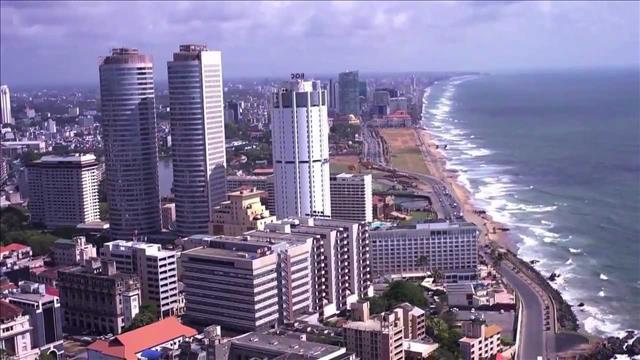
Op-Ed: Curing The Crisis In Colombo
Sri Lanka is under the grip of a chronic financial crisis. Gotabaya Rajapaksa, who once ran for the Presidency, ran from Sri Lanka – amid massive country wide protests for his resignation from Presidential post. As a consequence, Ranil Wickremesinghe, the six-time Prime Minister of the state, sworn in as the President on July 20, when the nation is going through her toughest phase.
Wickremesinghe, the leader of UNP, hasn't gained the people's vote. He was elected in the parliament. For the first time in 44 years of Sri Lanka's history, the Parliament directly elected a president. Prior to assuming the Presidency on July 20, while functioning as the acting president, Ranil Wickremesinghe declared emergency on July 18 under the Public Security Ordinance in the interests of public security, the protection of public order and the maintenance of supplies and services essential to the life of the community. Soon after he assumed the office, the parliament of Sri Lanka extended the emergency for a month on July 27 to stabilize the political and economic crisis. If Wickremesinghe continues to extend the emergency, the situation may get worse. The opposition in the parliament accused Wickremesinghe of announcing a crackdown on the peaceful agitators by using the state of emergency. During an emergency, the military has the power to detain people, limit public gatherings and search private property as well.
The nation of 22 million has been suffering from severe scarcity of essential commodities like fuel, food and medicines. The foreign reserves of the state have dried up. The foreign reserve is now around $250m. Wickremesinghe 's immediate priority will be to ensure food and essential commodities in his country. He will have to take strict measures to bring down price of food and fuel.
The island nation has borrowed more than $51bn from foreign lenders. China is the Island nation's third-biggest lender. But a sect of Lankan experts blame China for the disaster. The capture of Hambantota port is often viewed as a debt-trap. On the other hand, the Rajapaksas haven't cleared several Japanese projects. Japan is also a major lender to Sri Lanka. In order to get Japan's support, Wickremesinghe must review the Japanese projects. Japan and some other countries of the west are waiting for stability in Colombo to extend financial support.
The crisis in the island nation is terribly impacting not just Sri Lanka's port operations but also of India's. Since the crisis, many Sri Lankans have trespassed India through coastal lines of Tamil Nadu. India is the Island nation's third-largest business partner. But Indian exporters have refrained from trading with the nation, fearing payment issues. Sri Lanka immensely relies on her neighbour India for goods. Out of the total sugar it consumes, almost 90% is supplied by India. India supplies fuel, pharmaceuticals, milk powder, onions, fruits, engineering goods, chemicals, iron and steel, agricultural goods to Sri Lanka. In the 2021-22 fiscal year, India exported almost $5.8 billion worth of goods to the Island nation. It has gone down drastically. On the other hand, the volume of Sri Lanka's import is much more than her export. Hence it resulted in foreign currency shortage crisis.
Amid the crisis, Sri Lanka closed several diplomatic missions in Australia, Iraq, and Norway but several diplomats haven't come back to headquarter, despite being asked.“Following a recent decision by the Cabinet of Ministers, the Ministry of Foreign Affairs has initiated action to temporarily close down the Sri Lanka Embassy in Oslo, the Kingdom of Norway; the Sri Lanka Embassy in Baghdad, the Republic of Iraq; and the Sri Lanka Consulate General in Sydney, the Commonwealth of Australia; with effect from 30 April 2022,” the Lankan authority stated in an official communication in the very beginning of the crisis.
The catastrophe in Colombo showed Sri Lanka's diplomatic failure vividly. In this phase of crisis, it is also observed that only few diplomatic missions of Sri Lanka brought some results and showed ray of hope. Indian mission is certainly one of them. Lankan High Commissioner to India Milinda Moragoda hopped towns and reached out to several Indian leaders including Tamil Nadu chief minister MK Stalin. India has extended supports worth $3.8 billion in this year alone. In addition to financial assistance to get out of the balance of payment crisis, New Delhi has sent humanitarian aids in multiple consignments. The aids include rice, petrol, tons of milk powder, drugs and other pharmaceutical supplies. Tamil Nadu Chief Minister MK Stalin has sent additional aids for distribution in the Northern, Eastern, Central and Western provinces of the crisis hit nation.
Sri Lanka, under Rajapaksas, tilted towards China and made New Delhi annoyed. Not just once but at times. The state under Wickremesinghe will review her diplomatic relations with India, US and most likely Japan. In the process of negotiation with the IMF, the support of US and India are essential. Once the IMF comes forward to rescue the debt-ridden state, India is expected to announce more loans to Sri Lanka.
Reviewing diplomacy is a big task for Wickremesinghe. But the more arduous job would be in the front of economy. At the helm of power Wickremesinghe will have no choice other than bring reforms in several sectors. Central Bank of Sri Lanka may require autonomy and some government holdings in the state need to be privatized. In fact, Wickremesinghe's options are very limited to save the Island state from an economic isolation.
Author- Ayanangsha Maitra
Ayanangsha Maitra is a freelance journalist and PhD researcher. He writes for Khaama Press from India and tweets @Ayanangsha.
View all posts

Legal Disclaimer:
MENAFN provides the information “as is” without warranty of any kind. We do not accept any responsibility or liability for the accuracy, content, images, videos, licenses, completeness, legality, or reliability of the information contained in this article. If you have any complaints or copyright issues related to this article, kindly contact the provider above.






















Comments
No comment